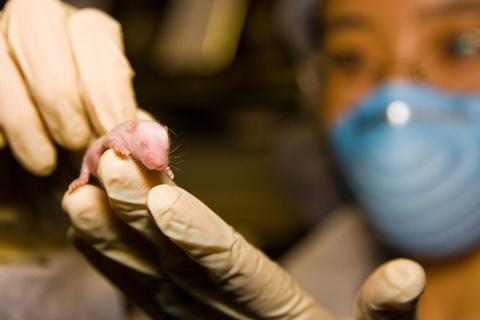The Welsh scientist whose cancer research is literally saving lives

A young woman from Merthyr Tydfil is helping to develop a blood test that may help treat cancer.
WalesOnline reports former Cyfarthfa High School pupil Caitlin Davies is researching a test that would be able to detect resistance to commonly used chemotherapy in men with prostate cancer. It means patients could be offered an appropriate treatment at an early stage, which would improve their chances of survival.
The twenty six year old from Pontsarn said the research is “very promising” and that it could be helping patients on the NHS within a matter of years, once trials are completed.
She said she is inspired by giving hope to individuals and families who are touched by the disease at some point in their lives.
Caitlin Davies studied biomedical sciences at Queen Mary University of London, before achieving a first class honours and being fast tracked onto a PhD course as soon as she graduated.
She said “At school I took the sciences and ended up going to London to study biomedical sciences. While I was there I undertook a project with one of the professors at Barts Cancer institute. Through that, I was fast tracked onto a PhD program. I was lucky enough to join a really interesting lab group working on developing blood tests to be able to diagnose and prognose cancer. I’ve been doing that for the last four years and I’m coming to the end of it now.”
She said patients would benefit from the blood test by avoiding invasive biopsies. It would also give clinicians a better idea of the most effective treatment the patient would respond to.
She said “The problem with cancers is that the main way to get cancer diagnosed is through a tissue biopsy, which means going in with a surgical procedure and taking the cancer cells. However, this is unpleasant and comes with a risk of infection amongst other issues. So we’re developing a simple blood test that can be done repeatedly and is non-invasive.
“When people have a cancer, the cells will shed from that primary cancer site into the bloodstream. By capturing these cells in the blood, we can use them to diagnose and use it to monitor the resistances of certain drugs, which is what I particularly work on.
“I work with chemotherapy. Some of those men are either never going to respond, or they might begin to not respond after treatment starts. There’s not really anything at the moment to monitor that or predict that, so I’ve been working on using this blood test, isolating those cells and looking at what the cells can tell us to predict whether a man may or may not respond to that therapy.”
She explained she is soon to hand in her thesis, concluding her role in the research, however that the blood test could soon be available for patients to benefit from.
She said “The research is almost complete. We’re writing some manuscripts to be published at the moment. But even though my particular role in this research is coming to an end, research in this field will be ongoing and it’s set to be verified in a larger cohort.
“At the moment, there are what we call ‘liquid biopsy blood tests’ that have just been put for use on the NHS, but those are looking at something slightly different to this research. If this was verified in a larger cohort and once we’ve done the clinical trials, we could at the shortest be looking at two or three years. But with clinical research, it depends on how many people are working on it and how many people they can get to sign up to the trial, but it is very promising. I personally think it would be a great thing to have on the NHS.
“It would mean avoiding unnecessary biopsies, where maybe a patient doesn’t have cancer and they’ve just presented with a symptom. Then particularly with my research, it would mean men who are never going to respond to chemotherapy – something very unpleasant – could have an alternative therapy that has a better chance of working.”
She said another benefit is that the blood tests can be done throughout a patient’s treatment to identify if they are becoming resistant to their therapy. It means they would be able to swap to a more effective treatment early on.
She said she wanted to go into medical research since she attended Cyfarthfa, where she studied maths, biology and chemistry for A-levels, achieving AAB.
However, she said her main motivation came from wanting to give hope to individuals and families struggling with a cancer diagnosis.
She said “We’ve all been touched by cancer in some way or another and obviously that is a driver. This particular area of research was interesting to me mainly because of its ability to be translated very quickly into something that could be beneficial to patients. I’ve worked alongside clinicians and patients, so it’s been really nice to have that really personal connection to the research.
“There’s still a lot of work to do, but It’s about giving hope to patients who might be undergoing cancer treatment or families who are struggling because their family member has cancer. That’s the most important thing for me, getting the message out there that there is active research going on and to give some positivity to patients.”
Image used for illustration purposes.








